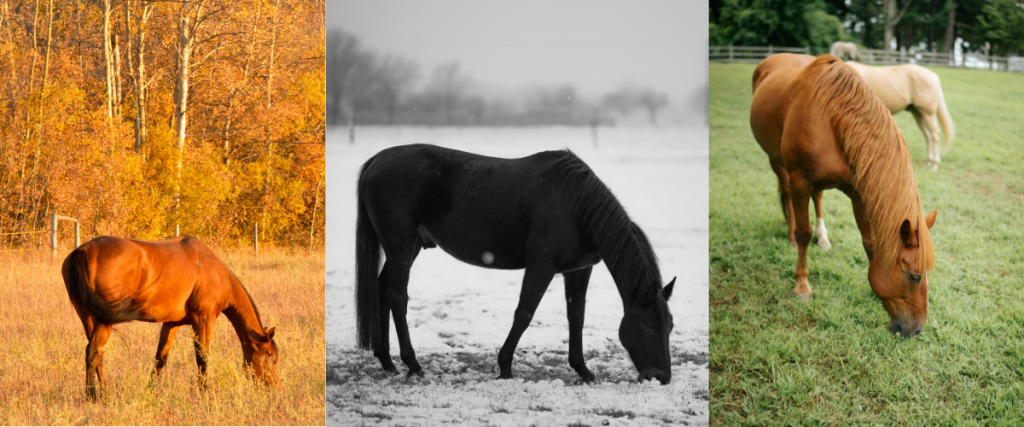Uncategorized
Seasonal Diet Changes for Horses
 Seasonal Diet Changes for Horses
Seasonal Diet Changes for Horses
As the seasons change, so do the nutritional challenges with feeding horses. Understanding these changes and properly managing them helps to keep your horses healthy year-round.
A horses digestive system is designed to continuously process forage. Types of forage include grass, hay, hay cubes/pellets and complete feeds. While all of these can meet your horses forage requirements, there are different considerations to look at with each option and dependent on horses individual nutritional needs and what is available based off time of year. Horse hay should be properly stored year-round to ensure that it isn’t getting wet and moldy.
Transitioning into fall:
As the daylight fades and temperature drops, grass growth slows and nutrient density decreases. Fall pastures often also start to accumulate nonstructural carbohydrates (NSCs – sugars and starches) which can cause stresses to horses, especially those with sugar sensitivities such as those with Equine Metabolic Syndrome and PPID who have increased worries about laminitis.
During this time of the year with pasture changes, it’s a good time to closely monitor horses for signs of stress while also slowly reducing pasture access and increasing hay or hay substitute. Depending on horses individual needs will determine what types of forage to feed your horses, for example some hard keeper horses might do better with an alfalfa mix while easy keepers will often do better with a more mature grass hay. Horses should always have access to fresh, clean water.
Transitioning into winter:
Feeding horses in the winter comes with its own set of feeding and management challenges. When the grass goes dormant in the winter horses rely even more on alternative forage sources. Horses typically need to consume 1.5-2% of their body weight in forage daily, spread out over the 24-hour span. Horses forage needs increase more as the temperatures drop below freezing as the digesting of forages helps to provide not only the additional calories needed but also the digestion process helps to keep them warm.
Some horses will need to have added supplements and grains to help keep their weight up during these colder months. When adding new supplements, such as our Equibuilder, it’s best to start adding slowly and allowing the horses digestive tract time to adjust. Adding in higher quality and calorie forages such as alfalfa is also a good option for some horses to help keep up weight in the winter. In addition to supplements that help support horses weight are supplements that help to support digestion such as Equiotic. Equiotic provides a daily dose of live, equine sourced lactobacillus reuteri to help keep your horses GI balanced during times of stress and diet change.
Water is always extremely important for horses, and especially in winter when horses are eating more dried forage (hay) and risks of lack of water due to water freezing risk. Many horses will not want to drink water that is extremely cold, and water becomes very difficult to drink if it has frozen over. Finding safe ways to keep water from freezing such as heated water buckets and troughs is a good way to ensure your horses continues to drink adequately in the winter.
Transitioning into Spring:
Like the fall pasture transition, transitioning horses back to pasture in the spring needs to be done cautiously. This is both for the protection of your pastures as well as your horses health. Slowly increasing horses grazing time on lush spring pastures helps to ensure they don’t experience digestive upset and metabolic issues.
https://extension.psu.edu/transitioning-horses-to-spring-grazing
https://extension.okstate.edu/articles/2022/equine-pasture.html
https://profiles-vetmed.umn.edu/article/spring-horse-tips
https://www.canr.msu.edu/news/managing_horses_on_spring_pastures
https://vetmed.illinois.edu/pet-health-columns/spring-grass-and-laminitis-in-horses/
